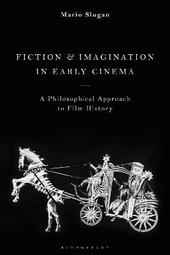
|
Fiction and Imagination in Early Cinema: A Philosophical Approach to Film History
Hardback
Main Details
| Title |
Fiction and Imagination in Early Cinema: A Philosophical Approach to Film History
|
| Authors and Contributors |
By (author) Mario Slugan
|
| Physical Properties |
| Format:Hardback | | Pages:280 | | Dimensions(mm): Height 234,Width 156 |
|
| Category/Genre | Film theory and criticism
Philosophy - epistemology and theory of knowledge |
|---|
| ISBN/Barcode |
9781788314121
|
| Classifications | Dewey:791.4301 |
|---|
| Audience | | Professional & Vocational | |
|---|
| Illustrations |
30 bw illus
|
|
Publishing Details |
| Publisher |
Bloomsbury Publishing PLC
|
| Imprint |
Bloomsbury Academic
|
| Publication Date |
28 November 2019 |
| Publication Country |
United Kingdom
|
Description
Shortlisted for the BAFTSS 'Best Monograph' Award 2021 When watching the latest instalment of Batman, it is perfectly normal to say that we see Batman fighting Bane or that we see Bruce Wayne making love to Miranda Tate. We would not say that we see Christian Bale dressed up as Batman going through the motions of punching Tom Hardy dressed up us Bane. Nor do we say that we see Christian Bale pretending to be Bruce Wayne making love with Marion Cotillard, who is playacting the role Miranda Tate. But if we look at the history of cinema and consider contemporary reviews from the early days of the medium, we see that people thought precisely in this way about early film. They spoke of film as no more than documentary recordings of actors performing on set. In an innovative combination of philosophical aesthetics and new cinema history, Mario Slugan investigates how our default imaginative engagement with film changed over the first two decades of cinema. It addresses not only the importance of imagination for the understanding of early cinema but also contributes to our understanding of what it means for a representational medium to produce fictions. Specifically, Slugan argues that cinema provides a better model for understanding fiction than literature.
Author Biography
Mario Slugan is Lecturer at the Department of Film of Studies, Queen Mary University of London. He is the author of Montage as Perceptual Experience: Berlin Alexanderplatz from Doeblin to Fassbinder (2017) and Noel Carroll and Film: A Philosophy of Art and Popular Culture (Bloomsbury Academic, 2019). He is also Fellow of the Society for the Cognitive Studies of the Moving Image, editor of the open-access peer-reviewed academic journal Apparatus: Film, Media and Digital Cultures of Central and Eastern Europe and book reviews editor of Early Popular Visual Culture.
ReviewsI highly recommend it. Dense with period references and informed by analysis drawn from film theory and historiography, it offers comprehensive, insightful and well-informed discussions of imagination, fiction and make-believe in the experience of film during the late C19th and early C20th. * Leonardo Reviews *
|